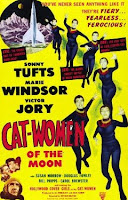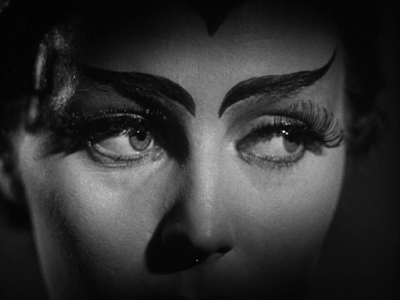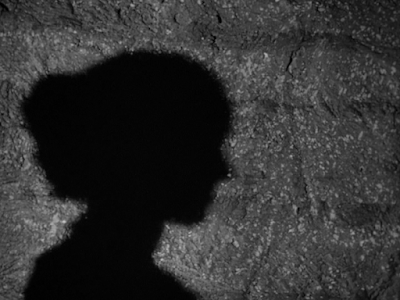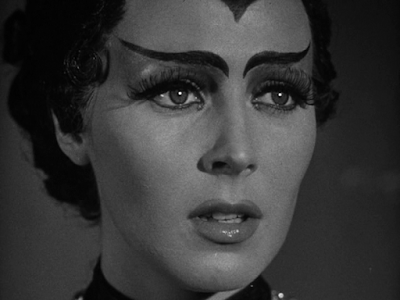n
nMmmm, black leotards pressing oh-so firmly against succulent space lady crotches. Oh, the tightness. The exquisite tightness. Those succulent space lady crotches didn’t stand a chance. You know, because of the tightness. The exquisite tightness. What I wouldn’t give to be a vulva-adjacent mole on the groin-adjacent loins of any of the moon women who appear in Cat-Women of the Moon. I mean, the air inside those the black leotards after a long day of seducing stupid Earth men must have been so dewy and damp. And to think, this movie was made in 1953! If ever there was a period in American history that was devoid of anything groin-related, it’s the early 1950s. Of course, I’m not saying crotches didn’t exist in 1953. It’s just that you didn’t often see them bandied about with such a reckless form of abandon as they are in this Arthur Hilton (Lassie) directed mini-masterpiece. Sure, the fact that the leotards worn by the moon women were black did obscure some of that sweet, sweet exquisite tightness I alluded to earlier. But if you use your imagination correctly (and I always do), you can savour the intense marriage of leotard and crotch this flick repeatedly conjures up without expelling too much mental effort. And isn’t that a sign of great cinema? Seriously, who wants to think while watching a movie? I know I sure don’t. And Cat-Women of the Moon required me to think very little.
n
n
n
n
n
n
nOf course, you’re going to have to endure at least thirty minutes of drab, low budget 1950s-style space travel before any leotard-ensnared space lady crotches can be relished to any extent. But trust me, it’s worth the wait.
n
n
n
n
n
n
n
n
nClearly the inspiration for “Animala” from The Lost Skeleton from Cadavra (both films boast the music of Elmer Bernstein), the moon women, or, as Kip (Victor Joy) calls them near the end of the movie, “Cat-Women,” all boast black leotards, funky eyebrows, and have their hair pulled back into delicious ponytails.
n
n
n
n
n
n
nLiving on the dark side of the moon in the valley of the shadows, the cat-like women of unknown origin manage to manipulate Helen (Marie Windsor), the navigational officer of an Earth rocketship, via feminine telepathy (all women, no matter what species they belong to, can communicate this way). The other part of the plan involves luring the Earthlings to their ancient moon city, distracting the male crew members by hypnotizing them with the swaying motions of their mouth-watering girl-crotches, and stealing their rocketship.
n
n
n
n
n
n
nAs you might expect, their plans go somewhat awry when a crew member named Doug (William Phipps) and a slinky cat lady named Lambda (Susan Morrow) fall in love. Since Doug is the first man she’s ever seen, Lambda goes ga-ga for the nondescript space traveler. The leader of the cat-women of the moon, Alpha (Carol Brewster), had no way of predicting this… or did she? Either way, the plan to turn Earth into a feminist utopia is in danger of failing before it even gets underway.
n
n
n
n
n
n
nIf only the other male space travelers were as easy to manipulate as Walt (Douglas Fowley) was, then the plan would have gone off with zero hitches.
n
n
n
n
n
n
nWhat I liked about the male space travelers is that each of them had their own distinct personality. The aforementioned Doug is a sucker for love and creamy vaginal intercourse, and the equally aforementioned Walt is a greedy opportunist who may or may not have a soft spot for creamy vaginal intercourse as well.
n
n
n
n
n
n
nThen there’s the aforementioned, but not as recently aforementioned as those other two aforementioned guys, Kip. He’s a cynical bastard who has a thing for Helen and thinks these cat ladies are full of hooey. And last but not least is Laird, played by Johnny Carson punchline favourite, Sonny Tufts. The ship’s captain, who does things strictly by the book, Laird, who also has a thing for Helen, is just as gullible as Walt, but he displays an advanced form of something I like to call “post-war swagger.”
n
n
n
n
n
n
nHowever, like I said earlier, Helen, not the men, is the key to the success of the cat-women’s plan. Now, was I disappointed by the fact that Marie Windsor doesn’t don a black leotard at any point during the film? Hell yeah I was. Nevertheless, I enjoyed the scenes where Marie Windsor struggles to resist the lure of the cat-woman. Sure, she’s struggling against her own self-interest (her rights in the cat-women’s feminist utopia version of Earth would have been greater). But then again, who wants to live on a planet filled with nothing but sexy, black leotard clad women with kooky eyebrows and more robust than usual ponytails? Wait. That didn’t come out right.
n
n
n
n
n
n
nMade during one of the most oppressive periods in modern American history, at least for anyone who wasn’t a white heterosexual male who fought in World War II, Cat-Women of the Moon implies that anything that threatens social norms should be shot in the back of the head. Actually, it’s not that bleak. Predicting the rise of the women’s rights movement (the National Organization for Women would be founded a decade later) and embracing Beatnik fashion well before it was in vogue (the term “beatnik” didn’t become common until the late 1950s), Cat-Women of the Moon is, in truth, full of revolutionary ideas. You just gotta look beneath the surface, daddy-o.
n
n
n
n
n
n
nSpeaking of Beatniks, I miss Off Beat Cinema (straight outta Buffalo, NY)… it’s where I saw Night of the Living Dead for the very first time. Keep watching the skies.
n
n
n
n













